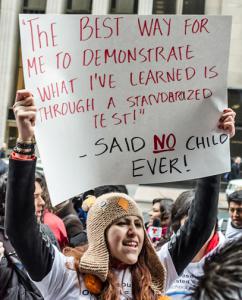Chris Brooks: The way I see it, right-to-work presents two interlocking problems for unions. The first is that unions are legally required to represent all workers in a bargaining unit that the union has been certified to represent, and in open shops the Duty of Fair Representation (DFR) requires unions to expend resources on non-members who are covered by that contract. This is commonly known as the free rider problem and it gets a lot of attention, for good reason.
The second problem is that open shops also undermine solidarity by pitting workers who pay their fair share to support the union against those who do not. This is the divide-and-conquer problem.
Shaun Richman: I had an article published in The Washington Post... trying to amplify.... the strongest argument that AFSCME is making, which is that the agency fee has historically been traded for the no strike clause and if you strike that there is the potential for quite a bit of chaos. So I wanted to put a little bit of fear to whoever might potentially have the ear of Chief Justice Roberts, as crazy as that may sound. But I also wanted to plant the seed of thinking for a few union rebels out there. If the Janus decision comes down as many of us fear then the proper response is to create chaos.
----- After Janus, Should Unions Abandon Exclusive Representation?
This is a must read piece on the post-Janus landscape - Michael Fiorillo posted it on the ICE listserve that is the most in-depth piece I've read on all the possibilities -- though the UFT is such a special case due to its size, outreach, the depth of its political machine - Unity Caucus, its alliances with politicians, etc.
The article deals with the requirement that unions must represent everyone --even those who leave - though we have so many examples of the UFT not exactly doing that -- or only paying lip service to do so. Like abusive principals or schools being closed. (Judge in PS 25 Win Asks: Where's the UFT support? “doesn’t the UFT care that the teachers will be put into ATR or the rubber room?” “doesn’t the UFT care that the teachers will be put into ATR or the rubber room?”)
When the sole bargaining agent, as is the UFT, a union must represent all workers, even non-union members. So what if they don't have sole bargaining rep rights?
Here is another excerpt (the entire article is below the break):
If we lose the agency fee, some unions will seek to go members-only in order to avoid the free rider problem, and that's a lousy motivation. I'm not encouraging that, but I think it's also inevitable. Once you have unions representing these workers over here but not those workers over there, it's also inevitable that you wind up with competitor unions vying for the unrepresented. And the first competitor unions are going to be conservative. These already exist. They're all over the South and they compete against the American Federation of Teachers (AFT) and National Education Association (NEA) in many districts and they offer bare bones benefits and they promote themselves on “we're not going to support candidates who are in favor of abortions and we'll represent you if you have tenure issues.” That's also bad but also inevitable.There are so many excerpts I could post, so read the entire article. But first a few thoughts of my own related to our own situation in the UFT.
One of the issues that have come up in the red state teacher revolts - all right to work - is the low union membership and an element of competition between AFT and NEA for members even though they are nominally working together. One West Virginia teacher revolt leader who is in a school predominantly NEA told me that when he suggested working in partnership with AFT people the county NEA people were not happy.
This brings us to the issue of sole bargaining agent, which I wrote about in last week's WAVE: School Scope: The Janus Right to Work Case - How Bad Will it Be For the UFT?
I went through a brief history of how the UFT won an election to become the sole bargaining agent in 1962 (in a 3-way race) for all UFT teachers and how that might be up for discussion in the wake of Janus when all states become right to work - and how that might lead to threats to the UFT's sole bargaining rights.
Say 10,000 people leave the UFT and organize an alternative and get enough signatures to call for their own bargaining by bringing in another union -- unlikely since this would be looked at askance by the labor aristocracy - but if those leaving the UFT weren't just looking to save money but were doing so as active organizers. Very unlikely but if the same kind of red-state militancy catches hold, the group most likely to organize would be the most disaffected from the union leadership -- pro-union people but anti-Unity Caucus.
Now I am not endorsing this concept but an intriguing idea that has been put forth is that since the high school teachers vote the opposition for most of the past 30 years - by a slim margin, albeit, what if the needed number of high school teachers singed up to call for an election in the high schools to select their bargaining agent? Now this is scary stuff since splitting the UFT does not look like a good idea - on the surface.
Last summer Mike Schirtzer and I ran a MORE summer series event that attracted 35 people to a bar and there was a lot more interest in the idea of a move to separate high schools than I expected -- I find a lot of resentment from high school teachers towards elementary school teachers who give Unity a seeming unassailable majority in UFT elections.
As James Eterno often points out, when there was a high school teachers association - pre-UFT- its militancy helped drive the formation of the UFT itself.
We can never know what will happen post-Janus and where a rising up here in NYC might take place and who those leaders might be. I bet right now they don't know that they may end up leading some of these. actions.
So here is the very long article - which I still have to read in depth as it gets into so many interesting areas with different opinions and especially covers the right wing attacks trying to undermine unions even when they are couched in worker interest terms.
And by the way, can an argument be made at this point to actually jump on board and support the UFT and its Unity machine given these attacks?
Especially when there is no meaningful opposition in the UFT, with MORE seriously thinking it won't run and the recent turmoil in MORE that amounted to a purge of those who don't agree with the policies of one faction - so Unity like.
Are the 2019 UFT elections worth sitting out? More on that in future posts.
After Janus, Should Unions Abandon Exclusive Representation?
http://inthesetimes.com/working/entry/21168/janus_ unions_exclusive_ representation_labor_right_to_ work_supreme_court







